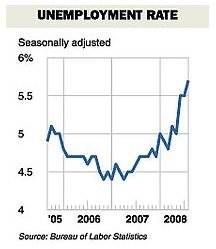How Unemployment Benefits Works: How Much Money are you Eligible For?
What Are Unemployment Benefits?
Unemployment benefits are paid to people who lose their job for reasons beyond their control. How much money do you get when you file for unemployment? This depends upon the state where you live and the reason you lost your job. Most states will not honor unemployment benefits if you were fired from your job due to insubordination or you quit your job when work was available to you at the company.
Because each state is different, if you do lose your job, check with the state’s department of labor office near you and ask if you qualify for unemployment benefits.
All states will allow you to apply for unemployment benefits, however, you may not be granted unemployment or your employer may appeal the unemployment claim.
Image Credit: Unemployment Rate by GreatCreation/Flickr Creative Commons
How Much Money Will You Get?
As mentioned above, each state varies in the amount you will get based on the time you worked in the past. Some states will offer you up to 66% of your gross wages, where other states offer only 50% of your gross wages. Other states have set maximum payouts depending upon your gross wages earned.
How long you have worked (without a break) also determines how much money you will receive. Some states require you work at least six to twelve consecutive months where others require up to eighteen consecutive months. If you have worked the required amount of time, without a break, the department of labor will determine what job you worked at the longest and will file for unemployment benefits from that prior employer’s account.
Keep in mind, it’s always a good idea to revisit your household budget if you have lost your job.
How Is the Employer Involved?
Every employer in the state where you live must contribute dollars, usually quarterly, to the state’s unemployment insurance pool. Once the department of labor decides where you have worked the longest, if unemployment insurance is granted to you, the money you receive will come from that employer’s pool of contributions.
How to Apply for Unemployment Benefits
First, visit your state’s department of labor. Most states now allow people who have lost their jobs to apply online, so do a search for your state’s department of labor and visit their website to see if you can apply online. If you can’t apply online, you will have to visit an office near you. Most states have convenient offices in every county and more than one office in large metropolitan areas.
To apply, you will need your full name and social security number along with where you have worked in the past. It’s best to keep track of the past three years of employment history, including your position, date of hire, date of termination, and immediate supervisor as well as the reason you left or were terminated from your job.
The department of labor will be able to determine if your employment history is correct by your social security number. When employers file their quarterly wage reports, they are required to submit your gross wages, name, and your social security number.
Even if you were fired from your job, you should still attempt to apply for unemployment benefits as some states, will allow fired employees to obtain unemployment insurance if the company they worked for can’t prove the employee was fired for insubordination.
Eligibility Guidelines

How much money you get when you apply for unemployment benefits and if you are eligible usually depend upon the following:
- Termination - If you were let go due to lack of work or laid off, you are eligible to obtain cash benefits.
- Insubordination - If you were terminated due to insubordination or violation of company policies, you may still be eligible if you can prove (by documentation) that you attempted to correct any problems with your employer but were let go anyway.
- Voluntary Quit - If you voluntarily leave a job when your employer has work available for you, the chances of obtaining unemployment benefits are slim.
No matter what the reason, you should still attempt to apply, however
Image Credit: Department of Labor by Erin Johnson/Flickr Creative Commons
How Long Can You Receive Unemployment Benefits?
Again, how long you receive unemployment benefits varies from state to state. The average is up to twenty-six weeks. Benefits are usually paid one to two weeks after you apply and are approved to receive unemployment insurance.
During the time you are receiving benefits, most states will require you actively search for a job and report to them what companies you attempted to find work. Depending upon your state, they may also require a form with a list of company names where you applied and a company representative’s signature indicating no work was available.
If a former employer appeals your unemployment benefits, you can respond to that appeal, but pay close attention your state’s department of labor guidelines on how to appeal an unemployment claim.
Taxes and Dependent Benefits
In almost every state, the unemployment cash benefits you receive are taxable. Most states will allow you to decide if you would like your benefits taxed before you receive them or if you wish to pay the taxes on your own. To determine if you need to have tax withheld from your benefits, you should look at your prior year’s tax returns and see what gross wages were and how much tax you paid. If you had to pay the Internal Revenue Service (IRS), it’s best to have your benefits taxed prior to receiving them. If you received a refund from the IRS, you most likely won’t need to have your benefits taxed.
Some states allow a small stipend for any dependents you are responsible for when you lose your job. A dependent is a person that lives with you and does not work and relies on your for monetary support to live. Ask your department of labor if they offer dependent stipends or dependent allowances when you apply for unemployment.
Tips on Filing for Unemployment Benefits
Follow these tips when applying for unemployment benefits to help the process flow more smoothly:
- Documentation - Keep records and pay stubs from all the places where you’ve worked for the last two years.
- Termination Documents - If you were terminated, make sure you received termination documents from your former employer which states why you were terminated. If you did not receive any documents, make sure to report this when applying for unemployment benefits.
- Gross Wage History - Keep track of the gross wages you received from each employer.
- Be Honest - Don’t submit false job information to the department of labor when applying for unemployment benefits. Because each state has the capability to retrieve your gross wages from their files, any false information will usually be ignored or you could be in danger of obtaining or losing your unemployment benefits.
To find out how much money you will get when you file for unemployment benefits, call or visit your closest department of labor office in the state where you have been the most consistently employed. Also, read more on Bright Hub if you or someone you know may need information about assistance with food stamps.
References
United States Department of Labor (https://www.dol.gov/)
United States DOL Wage and Hour Division (https://www.dol.gov/esa/whd/)
